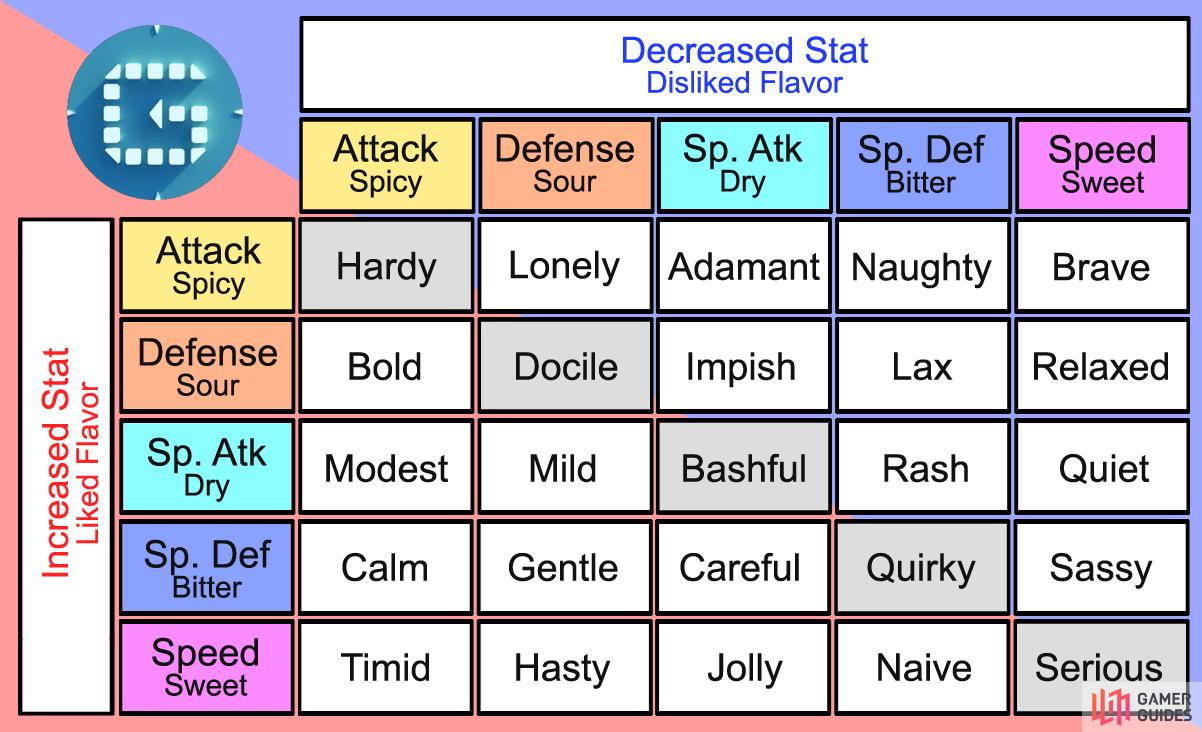Our Solgaleo is Jolly, which means it has increased Speed.
Like people and animals in real life, not all Pokemon behave the same. Some  Pikachu may be extremely energetic and rush about everywhere, regardless of the consequences, while other Pikachu may be more chill and relaxed.
Pikachu may be extremely energetic and rush about everywhere, regardless of the consequences, while other Pikachu may be more chill and relaxed.
Now you can’t physically see these traits, but each Pokemon indeed has a particular Nature , which can influence how they perform in battle. Natures are randomly assigned and you can identify a Pokemon’s Nature by pressing Right on the Pokemon’s Summary screen.
There are a total of 25 possible Natures, each boosting a particular stat by 10% and dropping another stat by 10%. This is also reflected on the Pokemon’s stat display–a red stat indicates a boost, while a blue stat indicates a drop. Or if the same stat is increased and lowered, you won’t notice a difference.
Using our example from earlier, a Hasty Pikachu will have slightly better Speed than most other Pikachus, but suffer from reduced Defense. Meanwhile, the Relaxed Pikachu has better Defense, but at the cost of reduced Speed. Which one is better largely depends on the circumstances and your preferences.
Taking Advantage of Natures¶
If you’re looking at your party now and facepalming at the sorry selection of Natures, don’t fret because, frankly, you can easily conquer the main story with the worst of Natures.
Still, when you’re competiting against other human trainers or the tougher post-game battles, having a beneficial Nature is one of the first things you need to get right. But how do you choose?
In general the best way to decide a Nature is to first identify what your Pokemon excels in, then pick a Nature that helps. For example, if the Pokemon is a powerhouse with physical moves, you’ll probably want an Attack-boosting Nature such as Adamant.
Meanwhile, if your Pokemon has incredible Special Defense, you may want to supplement it with a Nature that boosts Special Defense. The other thing you could consider is gunning for a Nature that boosts Speed since the Pokemon with higher Speed goes first.
Whatever you do, don’t pick a Nature that doesn’t boost any stats, such as Hardy. You may think it’s smart to have no weaknesses, but in the dog eat dog world of Pokemon battling, having no strengths is a bad thing. If you want to use both Physical and Special moves, go for a Nature that drops a Defense instead.
Likewise, don’t bother picking a Nature that covers for a weakness. The boost from a Nature is a 10% multiplier and multiplying a low stat is never as effective as multiplying a high stat. If a Pokemon has a low stat, you’ll just have to work around it or use a different Pokemon.
For example, referring back to Pikachu. Pikachu is capable of learning Volt Tackle , which is a physical move, and it can hold the Light Ball which doubles its Attack and Special Attack. Let’s say we want a fast Pikachu so it has a higher chance of going first, but we don’t want to sacrifice its Attack.
If our Pikachu is going to know only physical moves, we should aim for a Jolly Pikachu. But if we want our Pikachu to have a “mixed” set and learn both Physical and Special moves, we should go with Hasty or Naive. Don’t worry about Pikachu’s defenses because they’re poor to begin with.
Manipulating Natures¶
Many Abilities and items have additional effects not mentioned. Sneaky buggers…
Hang on, if Pokemon are randomly assigned Natures, how do you even choose them? Do you simply catch a lot of Pokemon and weed through the ones with Natures you don’t want?
Nah, thankfully things aren’t quite that difficult. There are two ways to make it easier to get a Nature you want, although some prior preparation is needed.
- A Pokemon with the Synchronize Ability at the front of your party will make it so all wild Pokemon encountered have a 50% chance of having the same Nature as it. Of course, you need to first acquire a Pokemon with Synchronize and the Nature you want.
- When breeding Pokemon, if one of the parents holds the Everstone item, they will pass down their Nature to their offspring 100% of the time. If both parents hold an Everstone, there will be a 50-50 split between which Nature is passed down. Highly recommended you don’t do that.




 Sign up
Sign up
No Comments